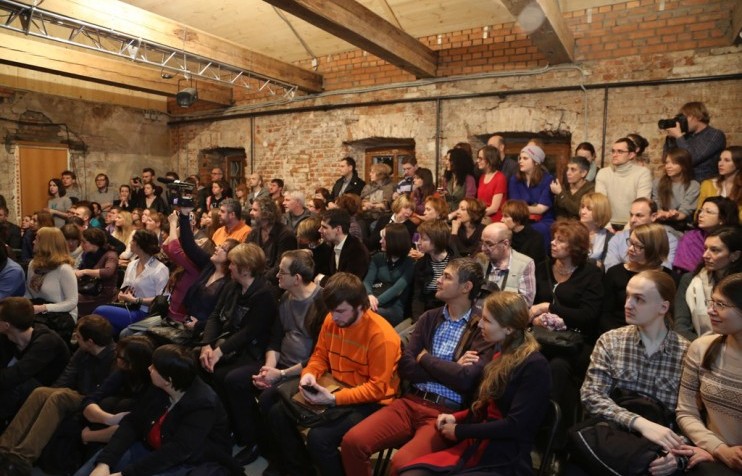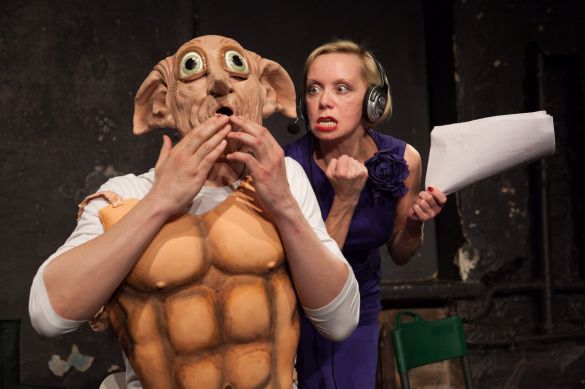Teatr.doc – Fearless theatre in Moscow
24 Jul 2018
Teatre.doc – an independent Moscow-based collective of theatre makers, actors, playwrights, directors – was founded by the playwrights Elena Gremina and Mikhail Ugarov in 2002. These two Courageous Citizens were nominated for the 2018 European Cultural Foundation Princess Margriet Award. However, we are sad to announce that, since their nomination, both Elena and Mikhail sadly passed away within weeks of each other in the spring of 2018.
An obituary for Elena in The Guardian celebrated her life and achievements, saying: “She became a public voice to be reckoned with, a sane and measured advocate for freedom of speech and compassion for the oppressed.”
Mikhail was remembered in the Moscow Times as “Russia’s father of documentary theatre”.
“Gremina and Ugarov were the brains, the brawn and the twin hot hearts of Teatr.doc,” John Freedman, a former theatre critic for The Moscow Times, wrote in the New York Times. “Doc, as everyone calls the playhouse, was a thorn in the side of tradition right from the beginning.”
Although the future of teatr.doc is uncertain in the light of Elena and Mikhail’s untimely deaths, particularly as the theatre was once again facing eviction at the time of their deaths, the couple’s friends and colleagues have vowed to continue their work.
“The most important way for us to thank Elena and Mikhail for their work is to preserve the theatre, which was their life, but is undoubtedly also our life,” actor and director Alisa Patlaj told Novaya Gazeta. “Everyone is determined.”
In honour of Elena and Mikhail, we wanted to bring you this special edition of Featured People, which explains how teatr.doc came about and highlights some of the achievements of these two Courageous Citizens who are sadly no longer with us.
How did teatr.doc come about?
In July 1999 a six-day seminar on new writing was held in Moscow under the direction of a delegation from London’s Royal Court Theatre. The seminar introduced young Russian playwrights and directors to the technique of verbatim theatre. This is a writing technique where a play is written on the basis of interviews conducted by the playwright (or by the creative team) with real people, who belong either to a particular social group or who share certain social circumstances.
Learning about verbatim theatre made such a strong impression on the young playwrights that, in December 2000, the first Russian festival of documentary theatre was held, with support from the Open Society (Soros Foundation).
A workshop followed in October 2001 and in February 2002 the group opened a theatre called Teatr.doc in a small basement in Trekhprudny Lane in the centre of Moscow, under the direction of Elena Gremina and Mikhail Ugarov.

What is documentary theatre?
“Documentary theatre” is used as an umbrella term to describe different types of plays that consciously and explicitly work with lived and embodied experiences as their main source. This is often informed by means of verbatim interviews, historical documents and autobiographical narratives. Using these methods, Teatr.doc explored post-Soviet reality and addressed subject matters or issues that were not covered by mainstream Russian media.
At first, Teatr.doc focused on social issues where the “other” was the main subject of their interest, such as migrant workers, drug addicts, women serving long prison sentences or people living with HIV. From 2010 onwards their plays became more explicit in voicing dissent against Vladimir Putin’s government and Sergei Sobyanin’s Moscow City Council.
Materials for these plays evolved to address conflicts in contemporary society.
Where dark satire meets political commentary

In 2012, Teatr.doc produced the political satire BerlusPutin, directed by Varvara Vaer. BerlusPutin is an adaptation of Italian Nobel laureate Dario Fo’s play The Double Headed Anomaly (L’Anomalo Bicefalo), Scientists create a monstrous hybrid of former Italian Prime Minister Silvio Berlusconi and Russian President Putin.
In Teatr.doc’s version, Berlusconi’s brain is transplanted into the head of Putin with disastrous results. The play satirises the friendship between Putin and Berlusconi, the former Italian Prime Minister who was described by the Russian leader as “one of the greatest European politicians”; after losing power during Italy’s debt crisis. BerlusPutin is an artistic critique of President Putin’s “managed democracy” – where dark satire and political commentary meet.
1 Hour, 18 Minutes refers to the length of time that Russian lawyer and Putin critic Sergei Magnitsky was denied medical attention in a Russian jail before his death. Magnitsky had exposed a network of corrupt businessmen and officials with links to the Kremlin. He was subsequently detained and beaten while in custody. Magnitsky’s death, and the circumstances surrounding it, have become something of a cause célèbre in the West. However, in Russia, alluding to these events in such a direct way and confronting head-on the links between the Kremlin and corrupt business dealings remains extremely dangerous.
Opening up new creative avenues
Teatr.doc’s introduction of verbatim dialogue and use of improvisation are credited with opening up new creative avenues for playwrights in Russia and with giving impetus to the “New Drama” movement. This has led to the emergence of a number of innovative and experimental directors and authors working in theatre, film and television.
The subject matter and fearlessness of Teatr.doc’s approach to authority has also gained international recognition. The company’s decision to stage plays that give voice to under-represented groups such as migrants from central Asia, ex-prisoners and LGBT people has made a significant contribution to the public debate on these issues inside Russia.
Teatr.doc has opened spaces for discussion that do not exist in any other areas of Russian society and by doing so has bravely defended the right to freedom of expression in a politically hostile climate.
As The Guardian writes in their obituary for Elena, she remained resplendent in her intelligence, her steadfastness and irrepressible joy in theatre in spite of the hostility she faced. “Theatre is a cure,” she wrote. “… and can relieve even unbearable pain for a time.”
